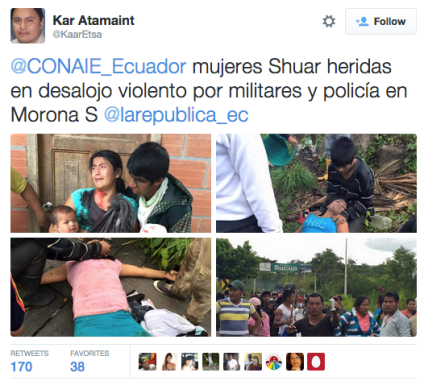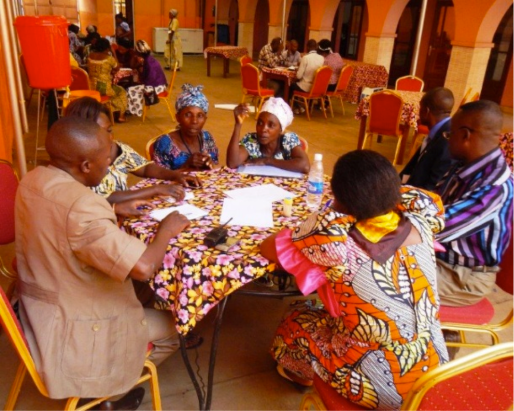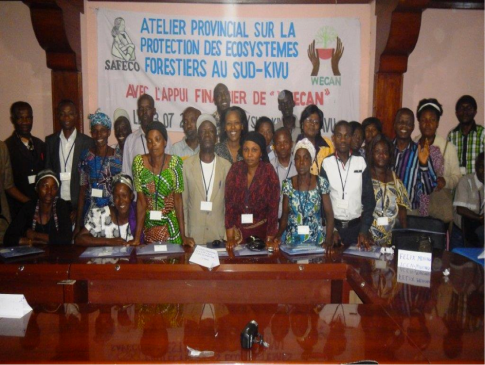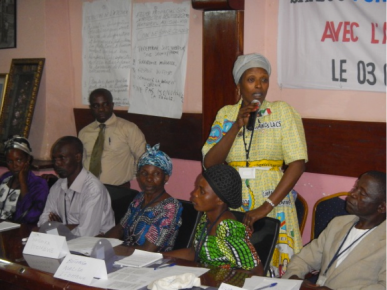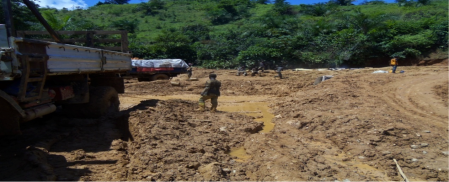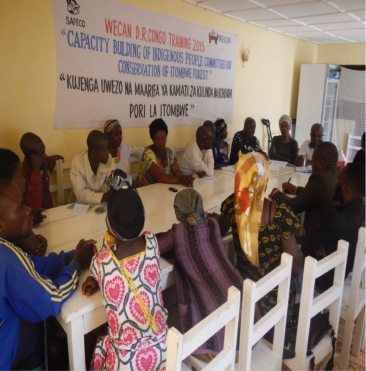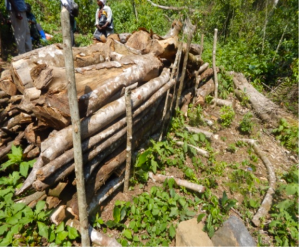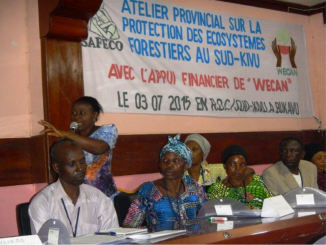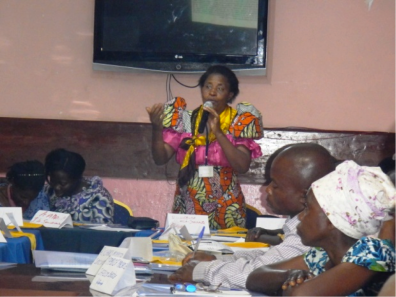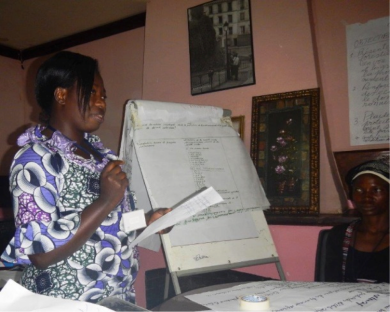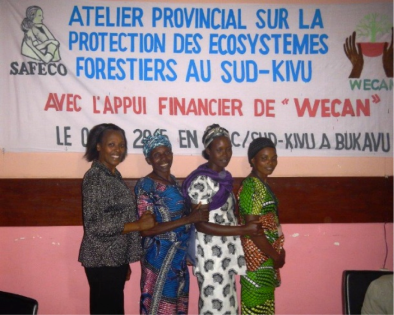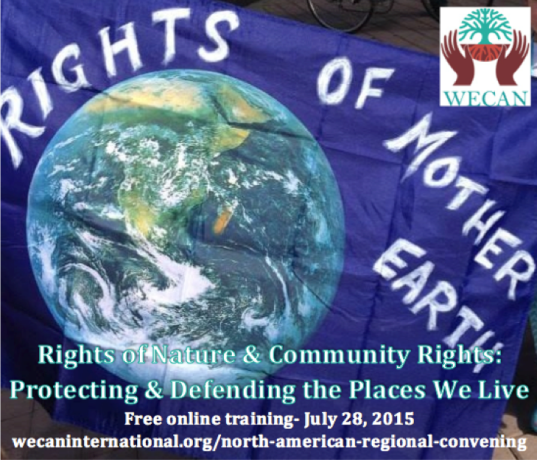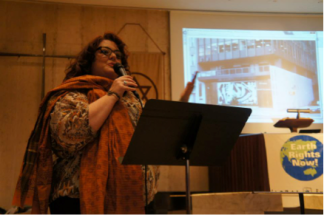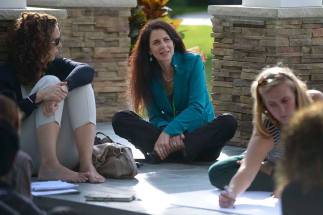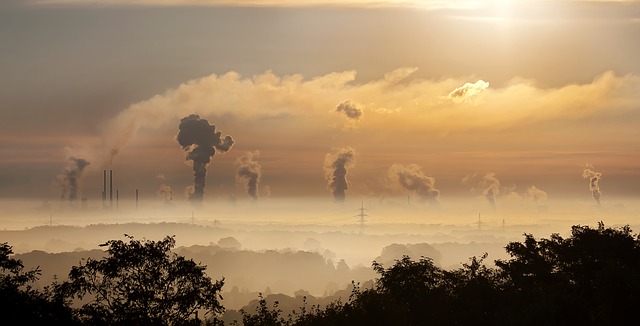Blog by Emily Arasim, WECAN International Communications Coordinator
On July 8 2015, the US Women’s Climate Justice Initiative presented the third in a series of online education and advocacy trainings. ‘Women on the Frontlines of Climate Change: Resistance & Solutions’ featured Kandi Mossett, Casey Camp-Horniek, Jacqui Patterson, and Pennie Opal Plant, four powerful women leaders at the forefront of movements for social and ecologic justice in their communities across the United States.

Osprey Orielle Lake, co-Founder and Executive Director of the Women’s Earth & Climate Action Network, opened the call with a warm welcome and brief background on key WECAN International principles, including dedication to women’s stories and solutions, and work within a climate justice framework centered on those who experience climate impacts “first and worst”.
“We need to examine the root causes of climate change and carry out deep systemic analysis around racism, sexism, and our economy of consumption as we seek to understand and address the planetary crisis we face,” Osprey reflected.
She described the US Women’s Climate Justice Initiative as one of the ways that WECAN International is seeking to examine these root causes and uplift women’s solutions. We are “weaving together different stories, sectors, struggles and conversations,” and addressing differing needs and privileges across diverse groups of US women, Osprey explained. With a word of thanks, she passed the floor to the first training speaker, Kandi Mossett.
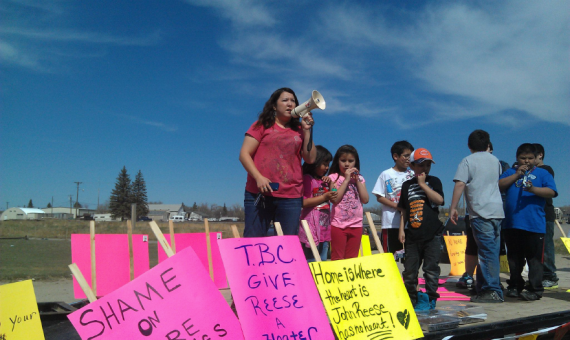
“Hello relatives my name is Eagle Woman,” she began, speaking in the language of her people.
Kandi is of Mandan, Hidatsa, and Arikara heritage, and was born and raised in an area known today as the Fort Berthold Reservation in North Dakota. She serves as the Native Energy & Climate Campaign Organizer for the Indigenous Environmental Network.
Click here to read more about Kandi’s work on the WECAN International blog.
Kandi’s home and the surrounding region has become a major extraction hotspot due to the large Bakken shale formation that lies beneath its soil. Expansion of the industry has been rapid and dangerous – destroying the land and bringing pollution, health complications, community conflict, and growing problems with crime and sexual violence.
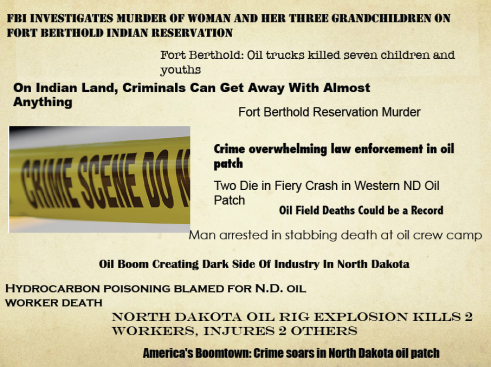
Collection of news headlines. Photo via Kandi Mossett powerpoint.
Kandi began with a description of the basic mechanisms of fracking, and then dived into the impacts being felt by the Earth and local communities. Flames from flaring natural gas send a constant stream of pollutants into the air. Prime agricultural and livestock lands have been poisoned. Trucks carrying volatile materials and toxic waste pass through towns 24 hours a day. Community members have been killed by the endless train of semi-truck traffic, and exhaust and dust pollution is exacerbating already severe health impacts. Kandi explained how these trucks dump excess frack-water on back-roads near the reservation, and that even when the waste is ‘properly’ disposed of, it is often simply dumped into plastic-lined earthen pits from which water seeps and wildlife drink.
A one million gallon spill occurred last year and killed everything it touched, compromising the safety of the lake from which Kandi’s community and others draw their drinking water. People have been told to keep off of land that has functioned as community space for decades, and an area that was previously quiet and sparsely populated is now flooded with so many industry lights that it stands out brightly in satellite images.
Kandi discussed some of the long-term and deeply felt social and cultural impacts of the oil boom. One is division within communities where some tribal council members welcome the fossil fuel companies and others speak out and resist.
Many of the biggest issues, she explained, revolve around ‘man camps’ – huge complexes of mobile homes used to house hundreds of men brought in to work on extraction sites. These ‘man camps’ have brought spikes in crime, drug use, and sexual assaults, particularly on Indigenous women and girls.
Kandi and members of her community continue to organize and fight back. They hold educational events, marches, and line roadsides with poster displaying their demands for change. They have had some successes, including stopping the construction of a new waste pit near a vital water source, taking back an important powwow which was sponsored by fossil fuels companies the previous year, and forming a new community group called Fort Berthold POWER, ‘Protectors of Water and Earth Rights’. Other successes have been short-lived, such as when they successfully stopped an oil refinery only to have it built in the neighboring town.
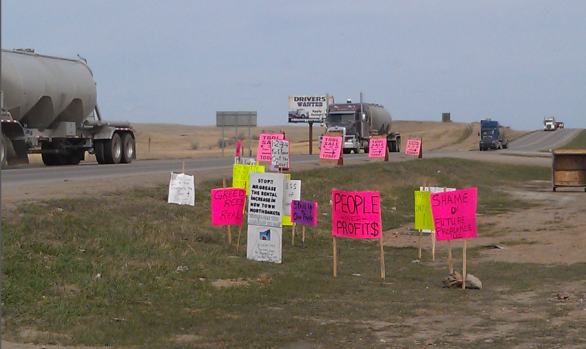
Photo via Kandi Mossett
During her presentation Kandi stressed the importance of water and the need to defend it from contamination. “Water is life,” she explained, “its no coincidence that when we have babies they are born in water.”
The situation in Fort Berthold and across the Bakken region is life or death for many, but despite this Kandi concluded her presentation with inspiring and hopeful insights. She encouraged training participants to focus on education, taking back power in their communities, and helping others make connections between the concept of climate justice and the injustices experienced in their daily lives.
“We must keep it in the ground and protect the generations to come,” Kandi concluded.
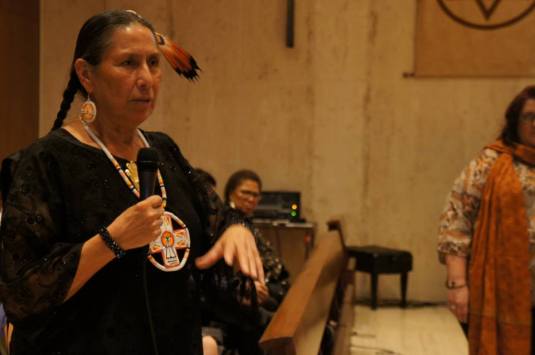
Casey Camp speaking at WECAN’s Sept. 2014 event in NYC. Photo by Emily Arasim.
Casey Camp Horneik spoke next. Casey is a long-time Native rights activist, environmentalist, and actress from the Ponca Nation in Oklahoma. She helps maintain the cultural identity of the Ponca Nation as a traditional Drumkeeper, and stands at the forefront of efforts to educate and empower Native and non-Native allies on environmental and civil rights issues in Oklahoma, and at the national and international level.
Like Kandi, Casey began with a greeting in the language of her people. “What an incredible healing time we are all participating in,” she reflected.
She described the “spiderweb” of pipelines crossing her region – including pipelines that stretch to Alberta, Canada, and from both coasts of the U.S. The intensity of fracking in her region has made Oklahoma the new earthquake capital of the US, with the number of 3.0 or greater earthquakes rising from 106 in 2013 to 585 in 2014 – with 400 thus far in 2015. According to Casey, the locations of underground pipelines, fracking injection wells, and recent earthquakes overlap quite closely.
“It’s difficult to talk about the issues in our homelands in a way that can help you understand the devastation that extractive industries have us under.”
In 2004 Casey’s small community of less than 800 people held one funeral per week. They have witnessed massive fish die-offs in poisoned waters and have been told not to eat the fish out of the river. Necessity and hunger have meant that some families have no choice, but the fact is that it is not a choice they should have to make at all.
Casey drew connections between the devastation being wrought by fossil fuel companies and the larger legacy of displacement and persecution of Indigenous communities in her region and across the world.
“We are experiencing a real and active genocidal process here in Oklahoma and we are only one people,” she continued, explaining that the genocidal process fueled by extractive industries takes many forms, including loss of language and spirituality, destruction of sacred sites, economic collapse, social breakdown, and long and short term health impacts.
“Our children are coming onto Earth with poison already in their body,” she lamented.
In explaining the deep impacts felt by her community in Oklahoma and others across the world, Casey also discussed the “normalized oppression” held firmly in place over many Indigenous peoples, and the depression and sense of hopelessness that goes along with it. Frontline communities like Casey’s can feel abandoned in their struggle, and it is time to change that.
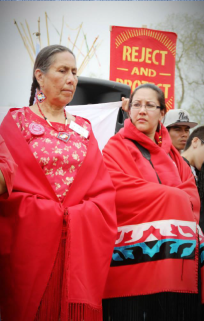
Photo via Casey Camp
“Right now we have the chance to turn this tide where we are participating fully in the healing of ourselves as women, daughters, granddaughters, sisters…We can find a way to make it happen so that our grandchildren can have grandchildren who will live because of what happened in 2015…We aren’t giving them our power any longer – we are recognizing where power really belongs – the true power is Earth,” Casey concluded, passing the floor to Jacqui Patterson.
Jacqui is Director of the NAACP Environmental and Climate Justice Program and Coordinator and co-Founder of Women of Color United. She has worked as a researcher, program manager, coordinator, advocate and activist on issues of women‘s rights, violence against women, HIV&AIDS, racial justice, economic justice, and environmental and climate justice. Some of her publications include “Climate Change is a Civil Rights Issue”, “Gulf Oil Drilling Disaster: Gendered Layers of Impact”, “Disasters, Climate Change Uproot Women of Color”, and “Coal Blooded; Putting Profits Before People” – which can be found in the resources section at the bottom of this article.
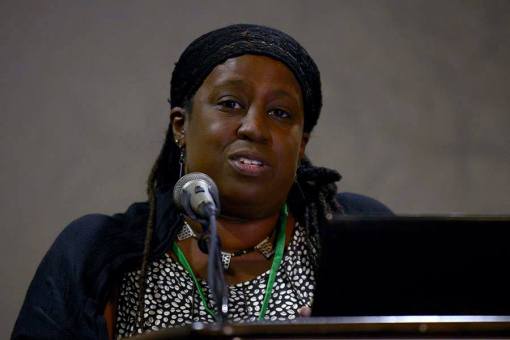
Jacqui at the 2013 Women’s Earth & Climate Summit. Photo via Lori Waselchuk
Jacqui began her presentation by framing the climate crisis in terms of our “dangerous relationship with excess” – be it food, transport, waste, or energy. She noted disproportionately severe climate impacts on low-income communities, peoples of color, nations of global south, and women, and zoned-in specifically on the skewed placement of coal-fired plants, fracking, mining infrastructure and landfills near communities of color.
Jacqui brought vital social issues to the table, including stories of children living near toxic sites who have become totally dependent on medications to combat asthma and respiratory problems, or who have developed learning disorders due to lead exposure. She tied environmental justice issues to the “school to prison pipeline”, explaining how people living near toxic sites have a 50% lower property value, which translates to under-funded schools because property taxes pay for local education systems. Lack of resources and teachers makes it harder for children to thrive, and children who do not reach a certain learning level by third grade are considered more likely to enter into the criminal justice system. Environmental injustice is thus deeply tied to cycles of poverty, criminality, and discrimination.
During her presentation Jacqui drew attention to the double damages felt by low-income families, Indigenous people, and communities of color who are affected both when industry extracts, pollutes, and dumps directly in their neighborhoods, and again when they find themselves on the frontlines of large climate disasters like hurricanes, droughts, and floods.
Jacqui discussed why we continue to find ourselves in this unjust and unhealthy situation, citing ‘powerbrokers’ including big corporations, courts, banks, think tanks, and academic institutions that are set on “maintaining the status quo of poor policymaking that values profit above people.”
In the face of mighty challenges, it is time for “Resistance, Resilience, Reclamation, and Revolution” she explained, shifting to a discussion of the experiences, solutions, and forward steps that the communities she works with are engaged in.
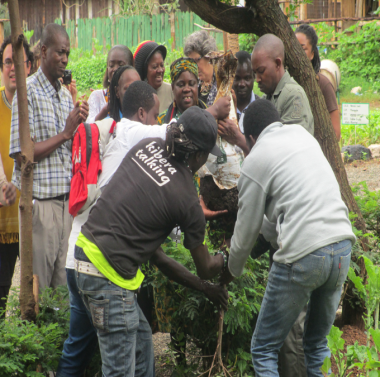
Photo via Jacqui Patterson
Jacqui reflected on “women as leaders in this freedom fight,” as she told the story of a woman in North Carolina who began her own ‘citizens investigation’ to document the illnesses being experienced by community members living next to a coal-ash pond. The woman took photos and notes that she began to have to mark with the letter D as friends and neighbors passed away. She too ultimately passed away from illnesses believed to be linked to the nearby contamination.
This story is harrowing and must be honored, however Jacqui also shared some exciting victories. She introduced the story of the Fisk and Crawford coal plant in Chicago, which was successfully shut down by organizers with the Little Village Environmental Justice Organization (LVEJO) and allies. She also touched on the growing movement to recognize corporate overreach, citing movements like Occupy and a citizen survey that found that the influence of money on elections was one of US residents top concerns. This is all part of the fight and the solution.
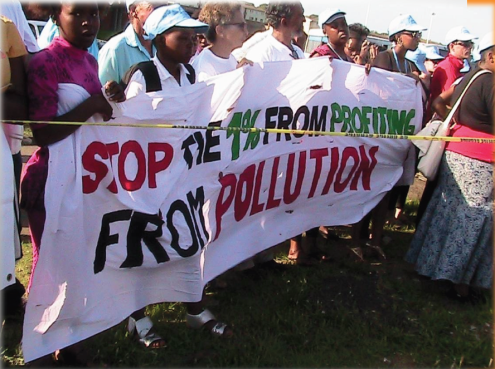
‘Stop the 1% from profiting from pollution’ – South Africa. Photo via Jacqui Patterson.
“We need to ensure that we are working together to root out all forms of oppression wherever it is,” Jacqui explained.
She echoed Osprey’s sentiment that we must look at both micro-level, immediate changes and solutions in how we live and our relationship with Nature, families, and communities – as well as at big picture systemic change. Extreme weather events and other climate stresses are having devastating impacts now, which means we must build resilience on a day-to-day basis as we work towards larger transformation. Jacqui called for “reclamation” of the commons, our communities, the energy grid, our food system, the shared economy, and our democracy.
Jacqui ended with a 1967 quote from civil rights freedom fighter Martin Luther King Jr: “One day we must ask the question, ‘Why are there forty million poor people in America?’ And when you begin to ask that question, you are raising questions about the economic system, about a broader distribution of wealth. When you ask that question, you begin to question the capitalistic economy…You begin to ask the question, ‘Why is it that people have to pay water bills in a world that is two-thirds water?’”
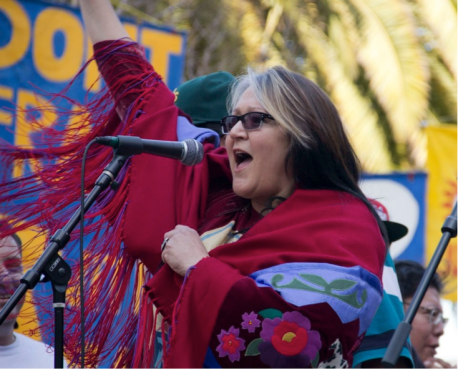
Pennie Opal Plant spoke as the final presenter of the day. Pennie is of Yaqui, Mexican, English, Dutch, Choctaw, Cherokee and Algonquin heritage, and has been an activist for over 30 years working on anti-nuclear, environmental, and indigenous rights campaigns. She is a founding member of Idle No More SF Bay, Movement Rights, and the Bay Area Rights of Nature Alliance, working ceaselessly to address climate change, fossil fuel extraction, and environmental injustice in and around her community.
Pennie began with thanks to her ancestors for making her a strong woman. She recognized all of the incredible efforts to heal the Earth happening in her San Francisco Bay Area community and across the world, but also reminded participants we still have a long way to go to bring awareness about the issues we face to the level we need.
“There is so much work for all of us to do to help people become activated and inspire them to see this beautiful new future that we imagine and people are already putting into place,” Pennie reflected.
“I’ve really realized that we have to call out for the complete end to all new fossil fuel infrastructure. Period… We know that we need to keep it in the ground.”
She explained clearly how continued fossil fuel development is bad for the Earth, bad for the investors who will face stranded assets as we transition, and bad for the communities who very well may continue to be abandoned with the mess to clean up.
Pennie outlined the situation in the Bay Area of California, where they are coping with Chevron, Conoco Phillips66, Tesaro, Shell, and Velaro refineries and a slew of other industrial sites. The latest are the proposed West Pack site, which seeks to bring oil from the tar sands in Alberta and the Bakken oil fields in North Dakota, and the Water Front Industrial Project, a fifty mile construction which will require the dredging of the delta and countless other harms.
In response to the refineries and the deep environmental and social damages they are causing, the idea of the Refinery Corridor Healing Walks was birthed out of a circle of Indigenous Grandmothers and the Idle No More SF Bay community.
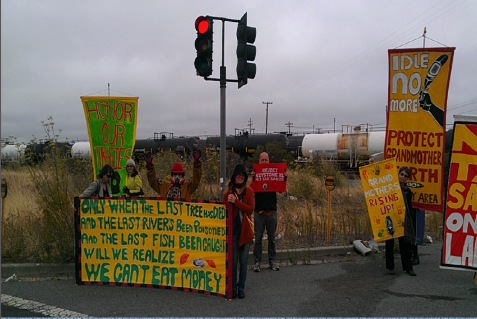
Photo via Pennie Opal Plant
For the second year in a row, this summer organizers took people out on four to nine mile walks between refineries to see the damage and smell the toxins that nearby communities experience everyday. It is action to walk, witness, heal, experience, and unite. Walks are led by Indigenous elders in prayer, and throughout the walk teachers and friends “share our understanding what it means to be alive in this system of life on Mother Earths belly.”
Refinery Corridor Healing Walks will continue next year and all are welcome to participate. Pennie also mentioned allies in Texas who are hoping to start healing walks through a refinery corridor in Huston, discussing her excitement that the idea of healing walks could be expanded and applied in other communities worldwide.
In closing, Pennie provided a brief background of Movement Rights, a new organization that provides organizing and legal support to helps communities assert their rights to self governance, ban corporate harms and take away corporate personhood rights, promote Rights of Nature, and write ordinances to put people over profit in their community.
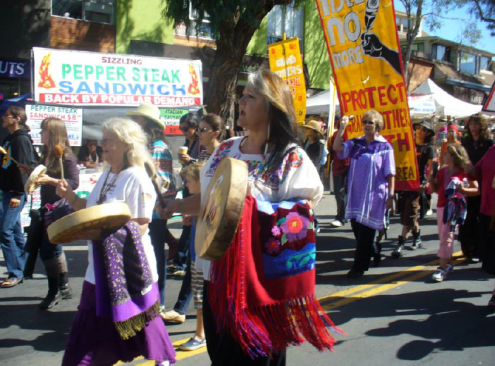
Photo via Pennie Opal Plant
Osprey Orielle Lake of WECAN International transitioned the group into a Question & Answer session with comments on the powerful spectrum of emotion felt during the four presentations, from deep grief to hope and inspiration. She opened the floor to training participants and speakers, who explored how allies can support and engage with the community movements highlighted during presentations.
Pennie shared the Refinery Corridor Healing Walks GoFundMe page and invited anyone in the Bay Area to join Idle No More for future actions and events. Kandi encouraged allies to contact North Dakota Senators Heidi Heitkamp and John Holden to push back against fracking in the state, reminding participants that “the water doesn’t stay in one area, the air doesn’t stay in one area, all of our local struggles are connected.”
Casey spoke frankly with participants about the need to get funding and other forms of support directly to the frontline communities whose “blood, sweat, and tears” go towards on-the-ground community organizing and resistance. She asked participants to share ideas on how to raise funds, get frontline communities connected into larger movements, and bring Indigenous leaders to speak to affected communities so that they can better understand the challenges they face and see how others are resisting, protecting the Earth, and uplifting their people.
Osprey closed the training with a deep thanks to everyone for their participation, encouraging them to share what they had discussed during the training far and wide. She also invited participants to share stories of the climate impacts their communities are facing and the solutions they offer as part of the Global Women’s Climate Justice Day of Action, happening September 29, 2015.
“Stories about women, frontline communities, and climate justice are not being told at the level we need them to be and this deeply hinders our movement forward. The more we amplify these stories the more change for climate justice we will see.”
Training Resources
